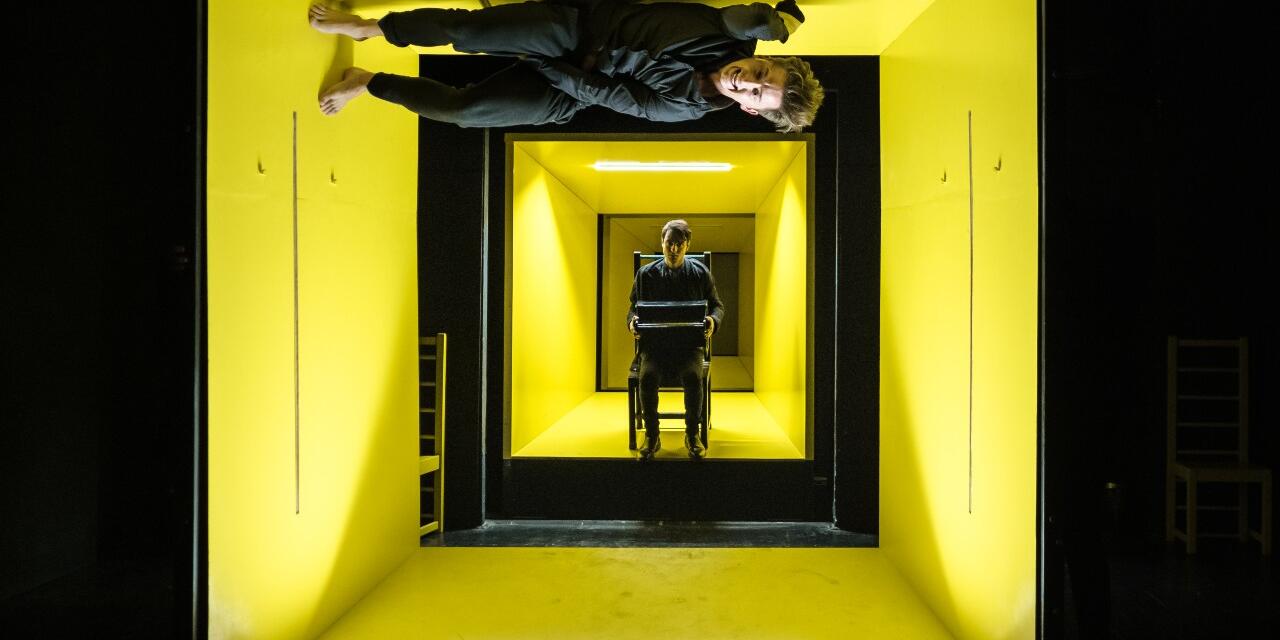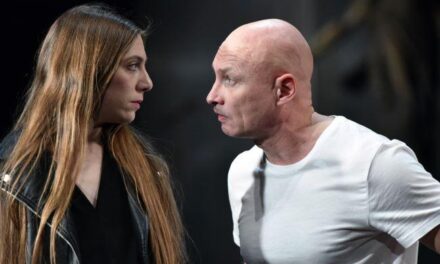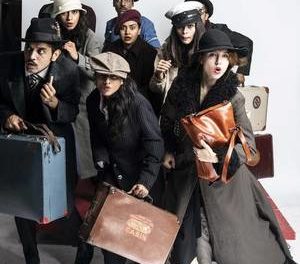At this “Desiré” festival in Subotica, on the stage of the Dezső Kosztolányi Theatre, at the very artistic and aesthetic peak of the festival, the performance Nero by the Hungarian theatre Studio K from Budapest, created an unprecedented spectacle from the text of Judit Garai written based on the novel The Bloody Poet a Novel about Nero, by the Hungarian writer from Subotica, Dezső Kosztolányi.
“The Emperor (Claudius) is dead! Let all the doors be locked! Call the senate! Let all the walls turn black.” A new emperor, Nero, appears in front of the audience. New dark ages begin within the black reflection of the theatre curtains. The darkness of the stage and the box in the middle which the entire scenes fit and in which the actors perform the acrobatics – are the audience’s focus points. The show begins. Explanation and realization, directed by Máté Hegymegi, tells the tragedy in an ironic tone.
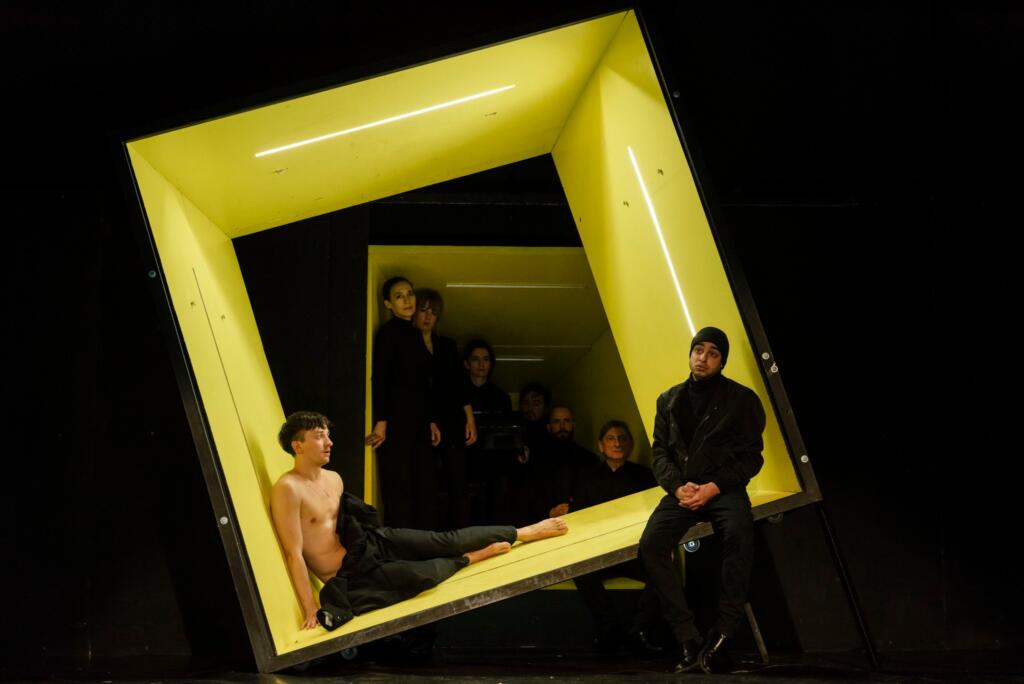
“Nero.” PC: Molnár Edvárd.
“Emperor Claudius, Nero’s stepfather, was immediately declared God. Nero emotionally recited the funeral oration. Everything indicated that the Roman Empire was expecting a gold age!” Nero, in the play, is played by the famous young Hungarian actor and director Attila Vidnyánszky Jr., who is interpreting in a unique way the historical figure – the famous ruler and murderer, the “great” poet and artist. Through the actor’s creation of the act, the audience sees the immature and naive, stupid, crazy and egotistical personality of the new Roman emperor – Nero, who is perfidiously perverted, full of envy and evil. The beginning of the play tells about the great suffering of a young ruler who tries to cope with his deteriorating pain in decadent times. Following the example of the great men of his time, to suppress the pain, suffering and hurt, he uses creativity and the craft of poetry because works of art are more permanent and more famous than those of rulers. He finds inspiration in ancient Greek tragedy, and by the art of the written word, he heals the open wounds of his soul. With his first poem, a desperate, long, exhausting and dull elegy about Agamemnon (through whose character he describes his own father), he “breaks through” with his “pomposity” into the world of “famous” artists. Because of his imperial position, he gains fame that everyone in the empire, from fear of death, is afraid to challenge. Teacher Seneca knew as well as others, that ” there is no help for neither the student nor the song.” The words of Nero’s poem aroused extraordinary acting performances by the audience, affected by the work of art where incessant tears flowed among the eyes of the spectators and numerous faintings occurred.
Since the emperor is above everyone, but in art, everyone is the same, all other artists and poets began to be eaten and swallowed by the emperor’s shadow. The period of artistic dictatorship (like any other) reigned. Nero’s principle is to be the best, at least for the price: to be the only one. Nero’s poems, the kids started learning by heart in schools and the great man of our stories – the emperor constantly was on tours to the towns and villages. Other poets were the competition, so they would get banned from performing and were exiled, but also killed if the emperor could not bear the power of their poetic talent. Putting away, in the cruelest ways, all those who did not consider him a poet of poets, an emperor, following the example of great artists recorded by history (such as Homer, and Sophocles, Euripides), decides to compose great works, taking Jupiter himself as a literary critic and witness. The author of the elegy about Agamemnon, the poem about Apollo, and the drama about Orpheus, who the muse seems to refuse to kiss, creates one after another – broken odes and epigrams, failed hexameters of failed thoughts, wrong forms and rhythms, empty, with a complete absence of imagination. Full of false modesty. He is possessed and obsessed with the glow of poetic fame. But behind the veiled delight is dissatisfaction, broken nerves, a sick mind, emptiness and darkness breakthrough, which spill over into the emperor’s immediate environment, the entire empire and all its subjects. In the play, historical narration and dramaturgical fiction are constantly interwoven, as well as the frequent dialogues and even more frequently said Nero’s monologues.
Private, poetic and public, upside down and perverted – all these are crossed in Nero and create an ever-widening gap between him and the world. Neither his mother nor his wife remains on his side. Claudia Octavia (Nero’s wife, played by Katalin Homonai) is the daughter of the deceased emperor Claudius. A dead soul, laying the body of a beautiful woman. Wilted flower from her tragic fate, from the painful death of her father and her marriage to a terrible ruler. She is terrified by the cruel deaths of loved ones that they expect with certainty. Her brother Britannicus (Adrijan Šamudovski), followed by misfortune and a curse, whom his father renounced without giving him power, is a talented poet, humble, sincere and silent in his words. One day, Nero will prepare a feast for him and feed him pineapple, a symbol of hospitality, and the real poet suddenly dies!
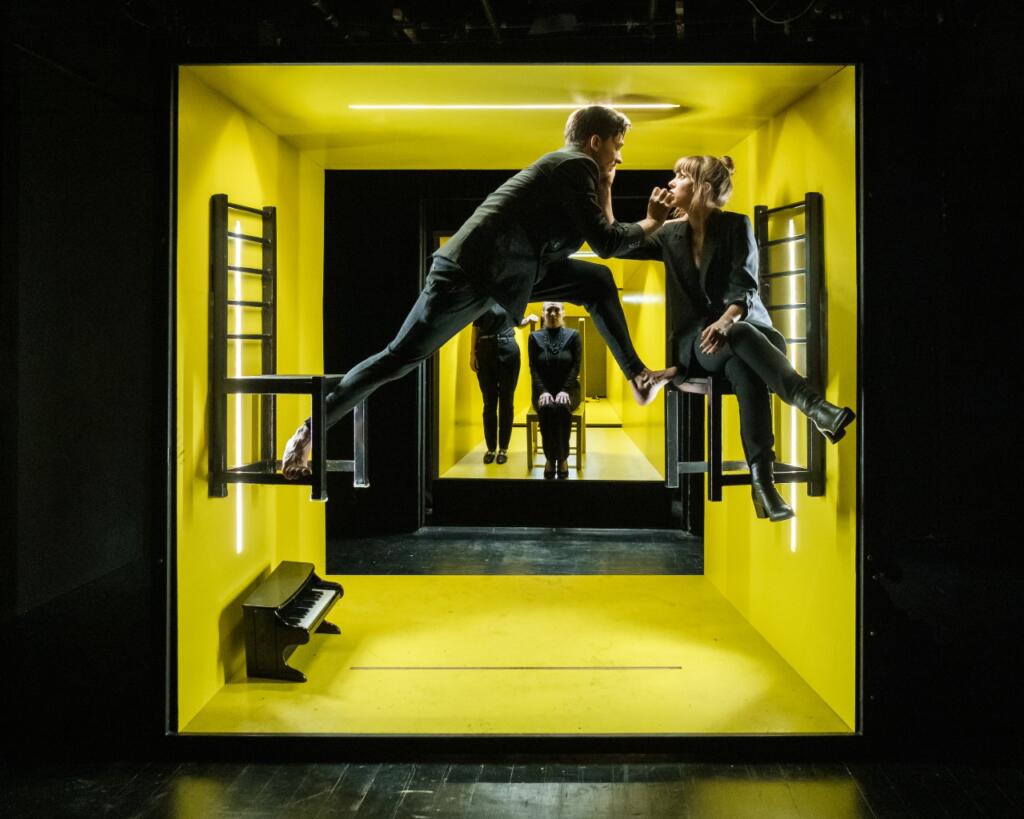
“Noro.” PC: Laslo Vaš.
Poppaea Sabina (Melita Palagi), Otho’s wife, an unusual and sad pale doll, will become Nero’s new love, mistress and the future little empress. She is the director of Nero’s fame and success. She knows how things work. In cooperation with Seneca, Poppaea presented to the world the “best” poet among poets in front of a large audience. She arranges invites for the patrician’s presence, bribes to suppress the riots and provides strict warnings that no one laughs while the great Nero talks about “Bacchus’ wife, with amber hair”, and orders to practice applause. The emperor’s desperate performance ended with thunderous applause. Then it would be the turn of the endless, seemingly eternal poet’s encore. There was no end to it: “people left the auditorium by throwing themselves on the ground and falling to pieces and acting dead, so they were carried out by staff”. But despite everything, Poppaea’s end will be violent.
Seneca (Lajoš Spilak)- the philosopher, artist, teacher and adviser of the young Nero thoughtfully follows and comments on the whole piece. Although he knows of Nero’s enormous poetic anti-talent, he builds his student’s fame without any artistic basis. All the good and great things Seneca has done in his life will be annulled by Nero’s existence and his behavior towards it. However, he will realize it at the end, at the last moments of his life, which Nero can and will end when he wants. Seneca spends describing his own death to benefit science and philosophy.
All the actors are in black. There is blackness all around. In the center of the stage is a big yellow box, multidimensional and multimorphic, representing the emperor’s chambers and the Roman stage of the arena where the poet triumphantly performs. Also, it is a place of metaphysical spaces where the main character, despite the gravity laws, maneuvers his body while verbally expressing his innermost thoughts. The only props on the stage are chairs, a saw and a small piano that sometimes looks like an accordion – a poetic melodic aid and sometimes it serves as a chair. This overall minimalism and the simple contrast of black and yellow colors highlight the powerful acting and the thoughtful director’s idea.
There is also an unusual and strong interaction between the theatre and the audience. “In circuses, arenas, even in the theatre, people (used to) shout all sorts of things to the actors… Last week, one actor became fully covered with blood. He got beaten by the audience because he was too tall.” Contrary to this ancient custom spoken from the stage, in this play, an entirely reversed procedure takes place. The audience of the play Nero is not isolated from the action on stage. Therefore, the auditorium is not protected and will be in a situation to direct feeling of the game of living and experience the emperor’s madness. At one point, the lights in the audience turn on. The lead actor throws himself into the audience, steps over people, takes off one spectator’s shoes, forces another to smell them, demands a girl to stand up and forbids a young man next to him to look at that girl. Nero jumps on people and reaches the fourth row, where he strips naked.
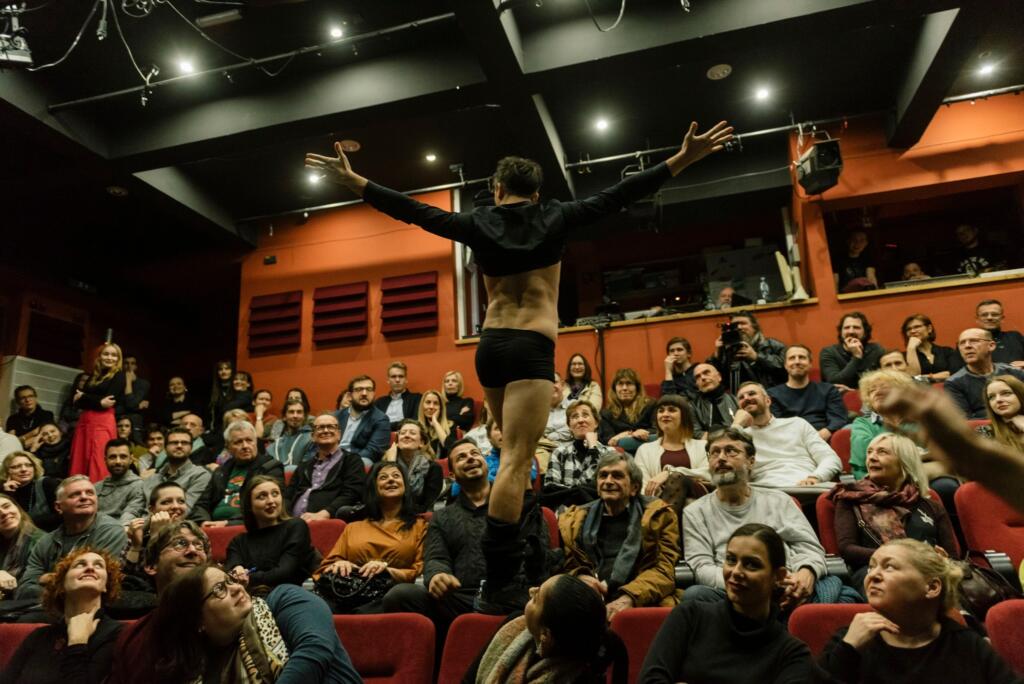
“Nero.” PC: Molnár Edvárd.
Nero’s farewell speech to the audience is interrupted due to the riot of the Romans (the audience). “Art and politics should not be confused.” Really? The gruesome figure of history mixed with a satirical depiction creates an allusion to the rulers of the new era. The statues of the old emperors are taken out and replaced with new statues, new emperors. The corpses of the past reflect in the present.
We have reached the end. In the full darkness. The “great” poet Nero is finally dead. All that remains is the propaganda, the myth of the barbarian burning of the city of Rome. This show brought us back to the Coliseum. “The theatre turned into a city under siege.” The performance ended with a long and, this time, sincere applause for Nero and true art.
This post was written by the author in their personal capacity.The opinions expressed in this article are the author’s own and do not reflect the view of The Theatre Times, their staff or collaborators.
This post was written by Emilija Kvočka.
The views expressed here belong to the author and do not necessarily reflect our views and opinions.

